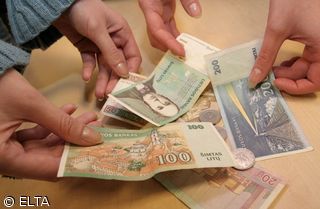This year Russia may start early debt payments to members of the Paris club of creditor countries assigning up to $10 billion from its stabilization fund for the purpose
Published:
2 January 2005 y., Sunday
This year Russia may start early debt payments to members of the Paris club of creditor countries assigning up to $10 billion from its stabilization fund for the purpose.
Foreign Minister Alexei Kudrin said earlier that the Cabinet may reach agreement on early debt payments with the Paris club in January. "I think that stage-by-stage cash debt payments are being considered as the main option," he said.
He said the scale of early debt payments to the Paris Club will depend on the capabilities of the Russian budget and the formation of the stabilization fund.
Russia may spend $7 billion to $10 billion on debt payments in 2005, about $6 billion of that amount to Germany which is Russia's biggest creditor among Paris Club members.
Kudrin said that the government plans to slash its debts to the Paris club in three-four years thinking it possible that as a result this category of debts would contract by over a half.
German media reports say Russia could be annually paying 10 billion euros in 2005 through 2007 ahead of schedule.
According to Finance Ministry files, Russia's debts to the Paris club went down from $47.7 billion at the beginning of the year to $44.4 billion on October 1.
Šaltinis:
Interfax
Copying, publishing, announcing any information from the News.lt portal without written permission of News.lt editorial office is prohibited.
The most popular articles
 According to the data presented by the Ministry of Finance, in end-January central government debt made up LTL26, 310.8 million or 28% of projected GDP for 2010 (LTL 93, 819 million).
more »
According to the data presented by the Ministry of Finance, in end-January central government debt made up LTL26, 310.8 million or 28% of projected GDP for 2010 (LTL 93, 819 million).
more »
 As far as countries affected by the economic crisis, China fared extremely well.
more »
As far as countries affected by the economic crisis, China fared extremely well.
more »
 The European Commission has authorised today a Slovak scheme with a budget of approximately €3.32 million which aims at supporting farmers in Slovakia who encounter difficulties as a result of the current economic crisis.
more »
The European Commission has authorised today a Slovak scheme with a budget of approximately €3.32 million which aims at supporting farmers in Slovakia who encounter difficulties as a result of the current economic crisis.
more »
 Commission sets out a 10-year strategy for reviving the European economy, casting a vision of ‘smart, sustainable, inclusive' growth rooted in greater coordination of national and European policy.
more »
Commission sets out a 10-year strategy for reviving the European economy, casting a vision of ‘smart, sustainable, inclusive' growth rooted in greater coordination of national and European policy.
more »
 The European Commission has launched today the Europe 2020 Strategy to go out of the crisis and prepare EU economy for the next decade. The Commission identifies three key drivers for growth, to be implemented through concrete actions at EU and national levels.
more »
The European Commission has launched today the Europe 2020 Strategy to go out of the crisis and prepare EU economy for the next decade. The Commission identifies three key drivers for growth, to be implemented through concrete actions at EU and national levels.
more »
 Launching of the “SCHOOLS’ initiative for innovation and changes” Grant scheme.
more »
Launching of the “SCHOOLS’ initiative for innovation and changes” Grant scheme.
more »
 EU Member States must not only deliver on their international aid pledges, but also bring in a financial transactions tax and a temporary debt moratorium, to help developing countries to cope with the effects of the global financial and economic crisis, said the Development Committee on Monday.
more »
EU Member States must not only deliver on their international aid pledges, but also bring in a financial transactions tax and a temporary debt moratorium, to help developing countries to cope with the effects of the global financial and economic crisis, said the Development Committee on Monday.
more »
 The EBRD is increasing its commitments to promote sustainable energy projects in Slovakia with a new €90 million funding under the existing Slovakia Sustainable Energy Finance Facility (SLOVSEFF) to ensure continuous implementation of energy efficiency and small renewable energy projects.
more »
The EBRD is increasing its commitments to promote sustainable energy projects in Slovakia with a new €90 million funding under the existing Slovakia Sustainable Energy Finance Facility (SLOVSEFF) to ensure continuous implementation of energy efficiency and small renewable energy projects.
more »
 According to the unaudited data, in 2009 AB Bank SNORAS earned LTL 8.7 million profit. The bank’s assets grew by 11 per cent up to LTL 6.342 billion during 2009 and were by LTL 647.8 million larger than at the beginning of 2009.
more »
According to the unaudited data, in 2009 AB Bank SNORAS earned LTL 8.7 million profit. The bank’s assets grew by 11 per cent up to LTL 6.342 billion during 2009 and were by LTL 647.8 million larger than at the beginning of 2009.
more »
 Aviation security measures that go beyond common EU requirements should be paid for by Member States, not by passengers, said Transport Committee MEPs in a vote on Monday that could put Parliament on a collision course with the Council of Ministers.
more »
Aviation security measures that go beyond common EU requirements should be paid for by Member States, not by passengers, said Transport Committee MEPs in a vote on Monday that could put Parliament on a collision course with the Council of Ministers.
more »